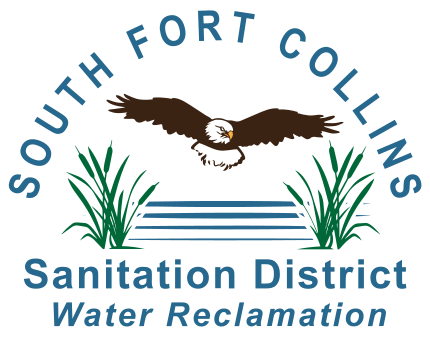Pretreatment
South Fort Collins Sanitation District (SFCSD) Industrial Pretreatment Program ensures that all local, state and federal regulations and standards are met regarding the quality of wastewater discharged into the City’s sanitary sewer system and wastewater treatment facility. Depending on the type of business, certain facilities may be required to “pre-treat” their wastewater prior to discharge into the sewer. “Pretreatment” means installing, operating and adequately maintaining pretreatment devices and/or systems to remove pollutants that could otherwise damage or obstruct the wastewater collection system or interfere with the wastewater treatment process. Pretreatment devices include gravity grease interceptors utilized to remove excess fats, oils and grease (FOG) from food service establishments, or sand/oil interceptors to remove excess grit, sand and petroleum oils from manufacturing facilities, auto shops, car washes and other operations.
SFCSD has implemented policies to ensure businesses required to pretreat their wastewater understand local regulations. Find more information on the different programs below.
FOG Program
Restaurants and other food establishments can produce fats, oils, and grease (FOG) through routine cooking and cleaning activities. If improperly managed, these materials can clog sewer pipes, resulting in backups into the facility, damage to the collection lines or sewage overflows in nearby areas.
A grease interceptor is used to remove FOG from water used for food preparation, dish cleaning, hand washing, and other activities before it enters the sanitary sewer. Along with best practices to manage your grease, remember to use a state-certified grease hauler to properly pump and maintain your grease interceptor every 90 days, at a minimum.
All new food service establishments are required to send construction drawings of the facility to their local sewer agency.
Best FOG Management Practices
In order to manage FOG and prevent sewer blockages, backups, and overflows, food service establishments must follow the best management practices below:
- Use drain screens
- Dispose of food waste in the trash
- Dry-wipe all cookware
- Use a grease receptacle for used cooking oils
- Keep cleaning products away from drains
- Employees must be trained to employ these best practices
For more information, please read our FOG Policy below:
FOG POLICY
Oil/Sand Program
Automobile maintenance and repair shops, car washes, manufacturing operations and equipment maintenance facilities all have the potential to introduce petroleum oil, grit and sand into the sanitary sewer. These pollutants can cause dangerous conditions in the sewer, can cause backups and overflows and have the potential to disrupt the treatment processes at the wastewater treatment facility. To better control and prevent petroleum oil, grit, and sand from entering the collection system, facilities may need to install a sand/oil interceptor prior to discharge into the sanitary sewer. Prior to building construction or remodeling, facilities are required to send construction drawings of the facility to their local sewer agency. Plans will be reviewed by SFCSD staff for compliance with the O/S Policy:
Oil and Sand Policy
Brewery & Fermented Beverage Program
Breweries and other establishments manufacturing fermented beverages have the potential to introduce pollutants such as excessive Biochemical Oxygen Demand (BOD) and high temperature waste causing a decrease in Dissolved Oxygen (DO), high or low pH, solids that contribute to sewer blockages, pipe and manhole deterioration through corrosion, interference with equipment, and have the potential to disrupt the treatment processes at our wastewater treatment facility. High BOD and high temperatures could cause a decrease in DO that can negatively affect the biology at our wastewater treatment facility as well as negatively affect aquatic life if released to surface waters. The purpose of this program is to minimize the loading of fermented waste from entering our treatment facility at the source. Prior to building construction, remodeling, or ownership change, facilities are required to send construction drawings of the facility to their local sewer agency. Users may be required to install an equalization tank for neutralization prior to discharge. Plans will be reviewed by SFCSD staff for compliance with the Brewery & Fermented Beverage Policy. All new Brewery & Fermented Beverage establishments are required to send construction drawings of the facility to their local sewer agency. Plans will be reviewed by SFCSD staff for compliance with the Brewery & Fermented Beverage Policy.
New Businesses
SFCSD evaluates new and existing businesses that have moved, experienced a change of ownership, or has undergone other significant changes (e.g. process change). A Pretreatment Questionnaire is used to identify and locate all possible businesses that may have additional pretreatment requirements.
The information collected is used to identify and control discharges to the sanitary sewer which might result in any or all of the following:
- Interfere with wastewater treatment plant operations
- Limit biosolids recycling opportunities
- Endanger the health or safety of wastewater collection system workers
- Pass through the treatment process to harm human health and/or the environment
An inspection may be conducted to verify the information after a thorough review. If process wastewater is determined to have the potential of causing a significant impact on the wastewater collection system, environment, or the wastewater treatment facility, the business must apply for and receive a permit from the SFCSD prior to discharging to the sanitary sewer.
SFCSD-Business-Questionnaire-2024-1.pdf
On This Page
The SFCSD Industrial Pretreatment Program ensures businesses meet standards for wastewater. Some businesses may need to "pre-treat" their wastewater. Pretreatment often means installing, operating and maintaining systems to keep water cleaner.
Restaurants produce fats, oils, and grease (FOG) through cooking and cleaning. FOG can clog sewer pipes, so removing them from wastewater is important. A grease interceptor is the main way to remove FOG from water. Car repair and manufacturing companies also create waste. The Oil/Sand Program helps these businesses keep waste out of the sewer. If you're starting a new business, please know you must be evaluated to see if you need to pre-treat your water.
